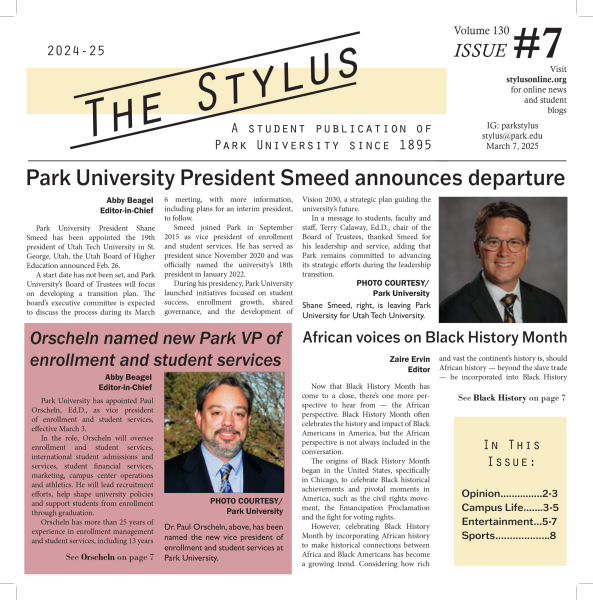Racism and sexism seen through the lens of philosophy
On Thursday Feb. 27 Park had a guest lecture by Ron Mallon, Ph.D., on the topic of racism and sexism through the eyes of philosophy. This lecture was sponsored by Park’s department of History, Political Science and Interdisciplinary Studies
Mallon is a professor of philosophy and the director of the philosophy- neuroscience psychology program at Washington University in St. Louis, Missouri.
There are many ways to understand an intense topic Mallon presented it in a deeper way to help understand what racism and sexism is through his understandings of philosophy.
“ Philosophy offers tools to consider the motivations and reasoning behind various points of view, to evaluate them for coherence, and to see the various costs and benefits of various positions,” said Mallon. “In studying social topics, it usefully supplements work by social scientists because of its emphasis on questions that cut across disciplinary boundaries and on clarity of thought and exposition.”
Mallon was invited to lecture by Joshua Mugg, assistant professor of philosophy at Park.
Mugg stated in an email, “We think best when we think together. Prof Mallon himself said this at the end of his talk we need dialogue, which means questions and criticizing. Sometimes in university it looks like your professors have all the answers and we all agree with one another. In fact, we don’t. In my view the very best research questions are the ones that are contestable where reasonable people can disagree.”
This is a delicate topic to some, but Mallon explained it by breaking it down into two questions: Can majorities be racist? And can woman be sexist?
His talk was aimed to help understand the concern for racism and sexism that has been a big issue for years. He presented this topic in many different ways.
“Put simply, one thing we hope to do is to be fair to others, and not hold arbitrary facts about them against them,” said Mallon. For example, when he says ‘arbitrary facts’ he is saying don’t hold a person’s race or gender against them.
“But another thing we hope to do is to address our cultural legacies of racism and sexism,” he said. “I hope by recognizing these different projects and the value of each sort, we can promote productive engagement with the problems of social morality we engage in everyday life.”
“Mallon suggests that there are just two distinct meanings of this word, and we would be better off spending our time discussing things other than how to use our words.” Mugg said.
The lecture given by Mallon was a good look into two major problems facing society today. He aimed at understanding that these concerns are themselves understood in multiple different ways, and in response to different values.
Your donation will support the student journalists of Park University. Your contribution will allow us to cover our annual website hosting costs, freeing up other funds for equipment, printing and training.






